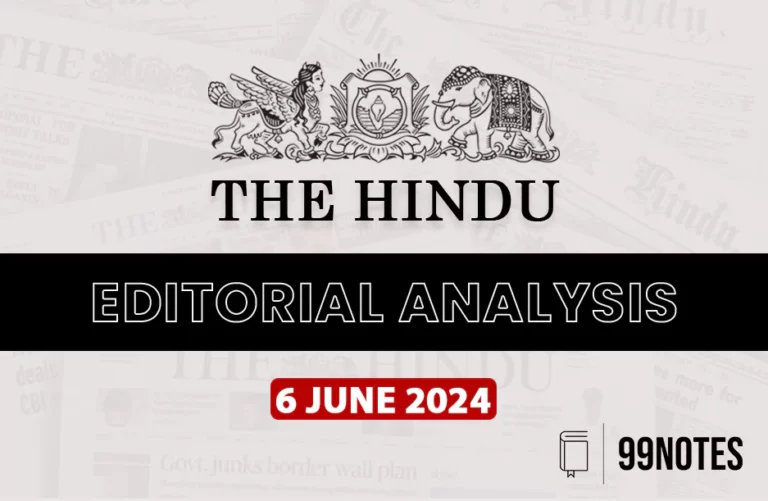17 April 2024 : The Hindu Editorial Notes PDF
The Hindu EDITORIAL
17-April-2024
1. Navigating life as a consumer with disability.
|
Topic: GS2 – Social Justice – Vulnerable Sections Understanding consumer rights for persons with disabilities is crucial for inclusive policymaking and social justice, relevant for UPSC aspirants. |
| Context |
| ● The article discusses the often overlooked consumer rights of persons with disabilities on World Consumer Rights Day, highlighting their struggles accessing goods and services and advocating for legal reforms and awareness campaigns. |
World Consumer Rights Day and the Invisible Consumers with Disabilities
- World Consumer Rights Day, celebrated on March 15 annually, aims to raise awareness about consumer rights, but often overlooks consumers with disabilities.
- Persons with disabilities encounter significant challenges in accessing goods and services, leading to loss of dignity, independence, and privacy in everyday activities.
Struggles of Consumers with Disabilities
- A person with visual impairment faces difficulties in tasks like booking a cab, navigating a supermarket, and contacting customer support due to inaccessibility.
- Inaccessible offerings and customer support options create barriers for consumers with disabilities, hindering their ability to lead independent lives and participate equally in society.
Responsibility and Change-Makers
- Businesses and governments bear responsibility for enhancing the consumer experience of persons with disabilities.
- Businesses typically design products and services for mainstream consumers, neglecting the needs of persons with disabilities who constitute 5-8% of India’s population.
- Government interventions, such as FSSAI’s advisory on QR codes for food products, demonstrate a step towards accessibility but need broader implementation across all goods and services.
Legal Reforms Empowering Consumers with Disabilities
- The Rights of Persons with Disabilities Act (RPWDA), 2016, grants rights to equality, accessibility, and reasonable accommodation, with provisions for universally designed consumer goods and accessible services.
- The Consumer Protection Act (CPA), 2019, empowers Consumer Commissions to impose penalties and award compensation against consumer complaints, but lacks dedicated rights for consumers with disabilities.
- Consumer awareness about existing rights and resources under RPWDA and CPA is crucial to ensure effective utilisation of legal avenues for redressal.
Challenges and Recommendations for Change
- Disability Commissions issue recommendatory directions, limiting effective redressal for accessibility violations, highlighting the need for stronger enforcement mechanisms.
- Alignment of CPA with RPWDA to incorporate dedicated rights for consumers with disabilities can enhance legal protection and encourage complaints filing.
- Awareness campaigns should focus on educating consumers with disabilities about their rights and available resources under existing legislations.
Conclusion
- Recognizing and addressing the challenges faced by consumers with disabilities is essential for promoting inclusivity and ensuring equal access to goods and services.
- Collaboration between businesses, governments, and legal frameworks can drive meaningful change and empower consumers with disabilities to assert their rights effectively.
| The Consumer Protection Act (CPA), 2019 |
|
● The Consumer Protection Act (CPA), 2019, is a landmark legislation aimed at safeguarding consumers’ rights and interests in India. ● It replaces the outdated Consumer Protection Act of 1986 and enhances consumer protection measures. ● The CPA empowers consumers to seek redressal for grievances and obtain compensation for damages caused by defective products or deficient services. ● It establishes Consumer Commissions at national, state, and district levels to adjudicate consumer disputes and impose penalties on erring businesses. ●The Act encompasses various consumer rights, including the right to safety, right to information, right to choose, right to be heard, and right to seek redressal. ● Key provisions of the CPA include stringent penalties for misleading advertisements, product liability clauses to hold manufacturers accountable for defective products, and provisions for e-commerce transactions. ●The CPA also introduces the concept of mediation as an alternative dispute resolution mechanism to expedite consumer dispute resolution. ● Additionally, the Act mandates the establishment of Consumer Protection Councils at the central and state levels to promote consumer awareness and education. ● Overall, the CPA aims to strengthen consumer protection mechanisms and ensure fair and transparent dealings between consumers and businesses in India. |
| Practice Question: Discuss the challenges faced by persons with disabilities in exercising their consumer rights and suggest measures to address them. (150 Words /10 marks) |
2. A referendum on India’s future.
|
Topic: GS2 – Indian Polity Understanding the evolution of Indian democracy is crucial for UPSC aspirants to comprehend contemporary political challenges and governance issues. |
| Context |
| ● The article reflects on the erosion of India’s democracy, contrasting the ideals of its first general election with contemporary challenges and emphasizing the need to uphold democratic values. |
Challenges to India’s Democracy:
- The 2024 general election is overshadowed by concerns that India’s democracy is under threat, with perceptions of it being reduced to an “electoral autocracy.”
- Key democratic institutions like the legislature, judiciary, media, and regulatory bodies are either weakened or influenced by political agendas.
- Hate politics, vigilantism, and minority demonization further erode democratic values, fostering an environment of fear and intolerance.
Stakes in the 2024 Election:
- The 2024 election is seen as a referendum on India’s democratic future, with a choice between ethno-nationalism and civic nationalism.
- It symbolises a struggle to uphold the pluralistic ideals enshrined in India’s Constitution against divisive forces.
- The election outcome will determine whether India remains true to its democratic ethos or veers towards authoritarianism.
Contrast with India’s First General Election:
- The first general election in 1951-52 marked a historic democratic experiment and a referendum on India’s future.
- Despite challenges like Partition aftermath and princely state integration, India embraced universal adult franchise and drafted a progressive Constitution.
- Jawaharlal Nehru’s leadership emphasised secularism, inclusivity, and nation-building, setting the tone for India’s democratic journey.
Nehru’s Vision and Leadership:
- Nehru’s leadership navigated internal party challenges and communal tensions to shape a stable, secular, and progressive India.
- He prioritised women’s representation in politics, encouraged voter participation, and advocated for secularism amidst communal strife.
- Nehru’s commitment to democratic ideals and nation-building laid the foundation for India’s democratic ethos.
Current Threats to Democracy:
- Unlike Nehru’s era, contemporary politics is marred by authoritarian tendencies, intolerance, and divisive rhetoric.
- The ruling party’s tactics of intimidation, polarisation, and curbing dissent undermine democratic principles.
- India’s democratic fabric faces challenges of communalism, majoritarianism, and erosion of civil liberties, posing a threat to its secular and pluralistic identity.
Call to Uphold Democratic Values:
- The 2024 election symbolises a battle for India’s soul, with the choice between harmony and hatred.
- It urges citizens to uphold the inclusive vision of India’s founders and resist divisive forces.
- Nehru’s legacy inspires a collective effort to defend India’s democratic principles and preserve its pluralistic identity.
Conclusion:
- The 2024 election resonates with the spirit of India’s first general election, embodying a struggle for democracy and inclusivity.
- It underscores the importance of defending democratic values against divisive politics and authoritarian tendencies.
- The election outcome will determine India’s trajectory as a democratic nation and uphold its constitutional ideals.
| Practice Question: Discuss the evolution of Indian democracy from the first general election in 1951-52 to the present day, highlighting key challenges and transformations. (150 Words /10 marks) |
For Enquiry

17 April 2024 : The Hindu Editorial Notes PDF

17 April 2024 : Indian Express Editorial Analysis

UPSC Topper 2024 List Released, Aditya Srivastava Tops

Top 7 Best IAS Coaching in Ghaziabad

16 April 2024 : Daily Current Affairs Quiz

16 April 2024 : Daily Answer Writing

16 April 2024 : Daily Current Affairs

16 April 2024 : PIB Summary for UPSC

16 April 2024 : The Hindu Editorial Notes PDF

16 April 2024 : Indian Express Editorial Analysis
April 2024 The Hindu Editorial 17 April 2024 : The Hindu Editorial Notes PDF The Hindu EDITORIAL
16-April-2024
1. Navigating life as a consumer with disability.
Topic: GS2 –…
April 2024 Indian Express 17 April 2024 : Indian Express Editorial Analysis Indian Express Editorial Analysis
17-April-2024
1. Moving past bonds
Topic: GS2 – Governance – Government…
Blogs Upsc UPSC Topper 2024 List Released, Aditya Srivastava Tops UPSC Toppers List has been declared on 16 April 2024, Aditya Srivastava from Lucknow has emerged as the…
Blogs Upsc Top 7 Best IAS Coaching in Ghaziabad IAS Coaching in Ghaziabad
If you are Ready to start your UPSC Preparation in Ghaziabad then you should…
Daily Quiz 16 April 2024 : Daily Current Affairs Quiz 16- April 2024 : Daily Quiz…
mains answer writing 16 April 2024 : Daily Answer Writing Mains Answer Writing
16-April-2024
Q1) Even though e-commerce sector is decentralizing global business…
April 2024 Daily Current Affairs 16 April 2024 : Daily Current Affairs Daily Current Affairs
16-April -2024- Top News of the Day
1. Jammu and Kashmir High Court Quashes Detention,…
April 2024 PIB 16 April 2024 : PIB Summary for UPSC PIB Summary for UPSC
16-April-2024
1. INDIAN ARMY CONTINGENT DEPARTS FOR INDIA- UZBEKISTAN JOINT MILITARY…
April 2024 The Hindu Editorial 16 April 2024 : The Hindu Editorial Notes PDF The Hindu EDITORIAL
16-April-2024
1. New data law, a barrier to journalistic free speech
Topic:…
April 2024 Indian Express 16 April 2024 : Indian Express Editorial Analysis Indian Express Editorial Analysis
16-April-2024
1. No longer a shadow war
Topic: GS2 – International…




